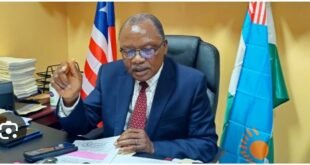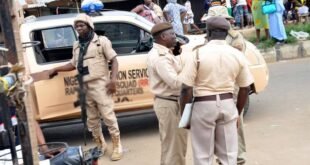Monrovia, Liberia – A detailed investigation has uncovered a troubling pattern of behind-the-scenes maneuvering by Ivanhoe Liberia, formerly High Power Exploration (HPX), to influence Liberia’s evolving railway governance framework in ways that could severely compromise national interest and investment integrity.
According to multiple sources with access to internal government discussions, Ivanhoe has been lobbying senior government officials, particularly those within the President’s inner circle including Minister of State Sylvester Grisby, to ensure that the company gains indirect control of the vital Yekepa to Buchanan railway. Rather than operate the rail directly, Ivanhoe is said to be positioning foreign firms of its choosing to assume operatorship under the guise of a government-sanctioned international tender.
In the middle of this strategy is the proposed framework being developed by the National Rail Authority (NRA), which would regulate rail usage, enforce equitable access, and collect user fees directly on behalf of the Liberian government. Publicly, Ivanhoe has argued that this model would ensure a multi-user system.
However, investigations indicate that the company’s real objective is to hand over rail control to one of two companies it has already lined up for the role: Thelo DB of South Africa and the Railroad Development Corporation (RDC) of the United States.
Both firms, sources confirm, are closely being supported by HPX’s executive network and have been quietly groomed to take over as rail operators. Should either of them win the bid, Ivanhoe is expected to receive preferential access to the rail corridor without having invested a single dollar in building, repairing, or expanding the infrastructure.
This comes despite Ivanhoe’s intention to transport ore from Guinea through Liberia, a move Guinea has not formally approved. The implications of this strategy are stark. Liberia’s most strategic mining and logistics asset could end up under the effective control of a foreign company that has made no financial or developmental commitment to the country.
This covert maneuvering also undermines the existing operator, ArcelorMittal Liberia (AML), which has invested more than $800 million in Liberia’s mining and transport infrastructure. AML’s user-operator status, secured under its Mineral Development Agreement (MDA), has enabled the company to manage and upgrade the rail and port systems at no cost to the Liberian state. Yet Ivanhoe continues to reject AML’s role, portraying it as monopolistic while promoting a supposedly fairer multi-user arrangement that masks its own plan to dominate rail logistics by proxy.
The dangers of ceding rail operatorship to a foreign entity selected through political influence rather than public interest are profound. For one, Liberia’s standing as an investment destination depends on the government’s ability to enforce contracts and treat all players equitably. Replacing a proven operator with a politically favored one risks damaging this credibility. Moreover, neither Thelo DB nor RDC has ever invested in Liberia’s railway infrastructure. Without financial commitment or operational history, their capacity or motivation to maintain and expand the corridor remains uncertain, potentially threatening the functionality of a critical national asset.
Thelo DB, based in Johannesburg, is a railway logistics firm with advisory experience in projects like Ghana’s $3.2 billion Western Railway redevelopment. The company is a joint venture with Deutsche Bahn’s engineering arm but has no direct investment record in Liberia. RDC, headquartered in Pittsburgh, Pennsylvania, operates short-line railroads in North and South America and has previously managed services in parts of Europe. While it has expressed interest in African expansion, RDC similarly lacks a history of investment in Liberia or West African transport systems.
Meanwhile, Ivanhoe itself has engaged in rail projects in the Democratic Republic of Congo, where its parent company signed an agreement to rebuild a 34-kilometer spur line to connect the Kipushi Mine to the national railway. It also signed a memorandum of understanding to export copper concentrate via Angola’s Lobito Atlantic Corridor. These examples show Ivanhoe’s willingness to engage in rail development, just not in Liberia.
Adding to the complexity is Ivanhoe’s highly publicized but stalled Liberty Corridor project in Liberia. In early 2024, while still branded as HPX, the company unveiled a $5 billion plan in partnership with the Government of Liberia and Guma Africa Group. The Liberty Corridor was billed as a transformative infrastructure initiative connecting Guinea’s Nimba region to a proposed deep-water port in Didia, Liberia. It promised a heavy-duty railway, a modern port, upgraded roads, cross-border hydropower expansion, and fiber-optic infrastructure to drive West Africa’s industrialization.
Despite the grand announcement, there has been little evidence of progress. No feasibility study, no environmental assessment, no construction. Guma Africa, a key partner in the announcement, has been silent. Liberians are left wondering whether the Liberty Corridor was a serious proposal or simply a PR strategy to pressure the government into handing Ivanhoe control over national infrastructure.
With no real investment on the ground, no clarity on financing, and no endorsement from Guinea, Ivanhoe’s ambitions in Liberia appear less about building and more about acquiring existing assets through political maneuvering. As international observers and Liberian stakeholders raise red flags, the government faces a critical decision: uphold the rule of law and defend national interests or allow foreign actors to compromise the country’s mining future under the false banner of fair access.
If Ivanhoe’s lobbying succeeds, Liberia could be surrendering the backbone of its economic infrastructure to a proxy operator, one that bears no financial burden, no developmental responsibility, and no obligation to serve the Liberian people.
 JamzNG Latest News, Gist, Entertainment in Nigeria
JamzNG Latest News, Gist, Entertainment in Nigeria









